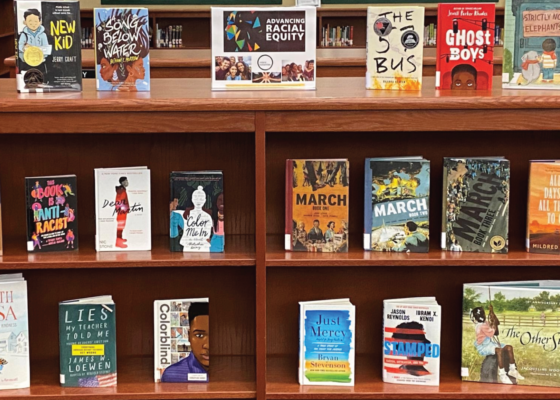5 things we learned from Robin Wall Kimmerer
July 14, 2023Thank you for joining us for last night’s INconversation with Robin Wall Kimmerer at the Eiteljorg Museum. We’re grateful to Robin and moderator Felica Ahasteen-Bryant, director of Purdue University’s Native…
Thank you for joining us for last night’s INconversation with Robin Wall Kimmerer at the Eiteljorg Museum. We’re grateful to Robin and moderator Felica Ahasteen-Bryant, director of Purdue University’s Native American Educational and Cultural Center, for their thoughtful exchange about the divine feminine, the unbreakable link between language and identity, traditional ecological knowledge and the power of gratitude.
As we like to do at Indiana Humanities, we’ve recapped the conversation below with “5 Things We Learned.” Here are some moments that stood out to us:
1. The power of women. As Sky Woman is a constant above, women are central to the life of communities. Kimmerer pointed out that the word for “elder woman” in Potawatomi also means “the ones who hold everything together.” She noted that in Anishinaabe culture, women have a particular responsibility for water, which Ahasteen-Bryant said was also true in Navajo culture. This link speaks to the life-giving and sustaining properties of both. Women, Kimmerer said, carry “a small mother earth in each of us. And so in these times of crisis, when we have lost our way, it is in part because we have been ignoring the divine feminine, we have been ignoring women’s ways of relationality and accountability to one another. For me, it is really gratifying to be in a time when it feels like the divine feminine is coming back into its own rightful power for healing, for healing people, for healing our relationship to the earth.”
2. Love languages. Kimmerer and Ahasteen-Bryant noted that languages carry within them the culture and history of their peoples, and so preserving them is a responsibility to the ancestors as well as the next generations. “It’s more than identity,” Kimmerer said. “It’s our worldview. … English forces us to objectify the living world, whereas in Potawatomi, we refer to all members of creation with the same language, same grammar that we use for our own families because they’re our own families. So those kinds of worldview, that powerful frame shift that’s present in the language, is really precious.”
3. The language was simply asleep. Talk of language continued as they spoke about the suppression of indigenous tongues as a tool of colonization and assimilation. Kimmerer said, “support for language revitalization by the governments who tried to take our languages away from us is an essential act of healing and reparation. It’s the right thing to do.” With or without external help, communities are taking it upon themselves to keep their languages alive. “The real heart of it is happening in our communities, where people are breathing life into the language again.”
4. Ways of knowing. Western science is the primary lens through which many generate knowledge and solve problems, but it isn’t the only way of seeing the world. Indigenous knowledge has always been here, but it is often dismissed as folklore by the Western world. “Traditional ecological knowledge is grounded in responsibility for knowledge, not just knowledge for knowledge’s sake. It’s grounded in our homelands, in our language, in our worldview,” Kimmerer said. They both referenced the Sloan Indigenous Graduate Partnership Program which supports education of the next generation of Native American students pursuing a master’s or PhD degree in diverse environmental sciences. “We invite young Native students to bring their whole selves to science, to not have to set aside cultural ways of knowing, but bring cultural ways of knowing into partnership with western science.”
5. The world is a gift. The overarching theme for the evening was gratitude, and Ahasteen-Bryant noted that the chapter “Allegiance to Gratitude” was her favorite in Braiding Sweetgrass. Gratitude is central to indigenous cultures, in relationships with plants, animals and each other. As educators, they both have been witness to an evolution in how their students approach the concept. “When you’re really deeply grateful, you understand that your life is completely contingent upon the lives of others, right? When you recognize that we are alive because of the gifts of other beings … when we understand the world as gift, we treat the world very, very differently. If we extend our gratitude to the living world, we will live in a really different way. It’s transformational.”
This INconversation was presented by Natalie Clayton, co-founder and broker, Maywright Property Co., and held in partnership with the Eiteljorg Museum and Herron School of Art.



